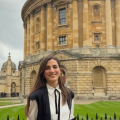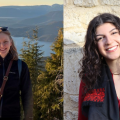
Student story: Alexander Colton
Alexander Colton is a Clarendon Scholar at Balliol College currently studying towards a DPhil in Oncology. As a cancer researcher, Alexander is interested in how to translate cutting-edge findings in the lab into clinical treatments that can benefit patients. In this student story, Alexander tells us about his journey to Oxford, and the research that he hopes will one day have a real impact on clinical outcomes.
The journey so far
My story is not the most dramatic. I was born in the UK and grew up in a small town called Wickford in Essex. After completing my A-levels I was successful in obtaining a place at King’s College London to study towards an undergraduate BSc Biochemistry degree.
I am the first scientist in my family and, unfortunately, I started my undergraduate studies in 2020, at the height of the COVID-19 pandemic. As a result, I spent the first two years of my degree working from my bedroom in Wickford. This meant that for two years I spent all of my time surrounded by non-scientists in the form of family, friends, and colleagues at my part-time job in a local pharmacy.
This isolation from other scientists forced me to focus consistently on why the molecular biology I was learning about mattered in the “real world” and how I could explain it to a lay audience. I still believe “So what?” is a question that should be asked far more frequently in science.
During the second year of my undergraduate degree I worked hard to obtain a summer research position within Professor Snezhana Oliferenko’s group at the Francis-Crick Institute. I loved this project, and will always be grateful for the opportunity, but I felt something was missing. It was a particularly strange experience to spend Monday to Friday each week in a leading London research laboratory studying the membrane dynamics and anaerobic growth of fission yeast, and then return to Wickford every Saturday to serve customers in my part-time job at Garbett Chemist.
Translational research
This disconnect between research and “the real world” is what led me to investigate research fields in which I could one day have a real-world impact. That summer I stumbled upon the field of translational cancer research. This is cancer research with the very long-term aim of moving the discoveries made in the lab into the clinic (from bench to beside), usually in the form of novel drug targets or biomarkers, to achieve tangible improvements in clinical outcomes. This finally gave me an answer to the question “so what?”
I have always believed in putting maximal effort into everything I do, so if I was going to develop a career in translational research I was going to do it properly. Firstly, I investigated cancer research groups around the country with experience of research translation in which I could aspire to complete a PhD. It quickly became apparent that one of the best possible groups was Professor Sarah Blagden’s at the University of Oxford’s Department of Oncology– a team with a track record of delivering discoveries into the clinic and in which I would likely have many exciting opportunities in the future. From here I worked backwards and developed a two-year plan to ensure my doctoral application would be a success. This involved undertaking a second summer project within a laboratory focussed on budding yeast research at the University of Oxford and a Master of Research in Cancer Biology degree at Imperial College London (from which I could learn the fundamentals of cancer research).
Oxford and beyond
After two arduous years, and several challenges along the way, I made it to the Blagden group and Oxford’s Department of Oncology as a DPhil student – just in time for the group to become the heart of a new alliance between GlaxoSmithKline and the University which aims to investigate the biology of pre-cancers and develop the world’s first preventative lung cancer vaccine (lungVAX). My bet had paid off! Here was a position in which I could both learn the fundamentals of organising a long-term research project and the basics of research translation.
I’m only six months into my DPhil and don’t know what the future holds for my career, but I look forward to the opportunities available over the next four years. Outside of my studies I have been involved in outreach activities organised by the University. This has included giving a lecture about careers in cancer research to other state-educated students as part of Balliol College’s Insight into Science program, and presenting my DPhil project to my fellow Clarendon Scholars at their ScienceSlam.
I am proud to have started my career at a comprehensive school before transitioning to a local grammar school, Southend High School for Boys (a fantastic place to study), to undertake my A-level studies. However, this experience has also highlighted to me the disparities in opportunities, support, and encouragement between these two types of school. I am passionate about encouraging others from state-educated backgrounds to develop careers in scientific research and look forward to engaging in more outreach activities throughout the remainder of my DPhil and beyond.
The biggest lessons I’ve learnt in my career so far – you can achieve almost anything you set your mind to. The key is learning to be elastic and to bounce back regardless of what is thrown at you. Life is an exercise in getting back up and looking for the positives.
No one is born with incredible talent or genius, but if you have enough perseverance and an optimistic attitude you can achieve anything.
If you would like to share your own student story, email [email protected] or DM us on our @OxUniStudents Instagram.
 Student story: Finding space for Kosovo at Oxford
Student story: Finding space for Kosovo at Oxford
 Oxford students shortlisted as McCall MacBain Scholarship finalists
Oxford students shortlisted as McCall MacBain Scholarship finalists
 Student story: My time at Oxford has been deeply transformative
Student story: My time at Oxford has been deeply transformative
 Welfare blog: Dealing with imposter syndrome
Welfare blog: Dealing with imposter syndrome
 Student story: Rowing sabbatical officer
Student story: Rowing sabbatical officer